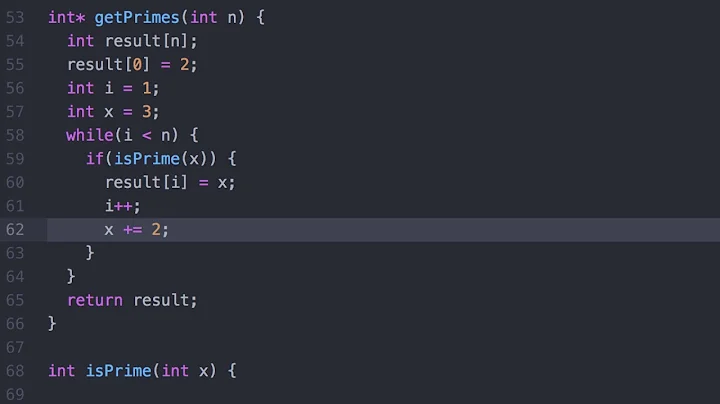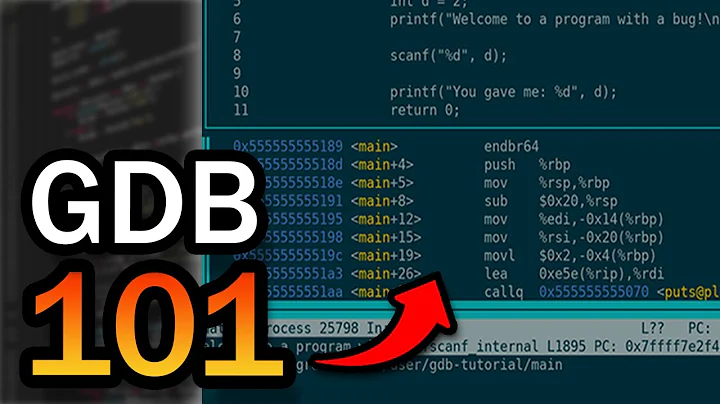accessing command-line arguments with gdb
Solution 1
Yep, your problem is the lack of symbols, not included at compilation time.
To compile with debugging information:
$ gcc -g3 cmdargs.c -o cmdargs
Then:
$ gdb ./cmdargs
...
Reading symbols from ./cmdargs...done.
(gdb) b main
Breakpoint 1 at 0x400545: file cmdargs.c, line 6.
(gdb) r
Starting program: cmdargs
Breakpoint 1, main (argc=1, argv=0x7fffffffdc28) at cmdargs.c:6
6 printf("%s: %s\n", "argv[1]", *++argv);
(gdb) p argc
$1 = 1
(gdb) p argv
$2 = (char **) 0x7fffffffdc28
(gdb) p *argv
$3 = 0x7fffffffe00c "/home/jcgonzalez/cmdargs"
See, now you get access to the symbols (they are recognized), as well as to the line numbers. As shown by Let_Me_Be, you can access single array elements with array[n] notation, but you can also show all the command line arguments at once (including the [0]-ed one) with the *[email protected] notation. Note that the first argument in the following example is a quoted string:
(gdb) set args "this is an argument" these are four more
(gdb) r
Starting program: cmdargs "this is an argument" these are four more
Breakpoint 1, main (argc=6, argv=0x7fffffffdbd8) at cmdargs.c:6
6 printf("%s: %s\n", "argv[1]", *++argv);
(gdb) p argc
$4 = 6
(gdb) p *[email protected]
$5 = {0x7fffffffdfe6 "/home/jcgonzalez/cmdargs", 0x7fffffffdfff "this is an argument", 0x7fffffffe012 "these", 0x7fffffffe017 "are", 0x7fffffffe01b "four",
0x7fffffffe020 "more"}
(gdb) p argv[1]
$6 = 0x7fffffffdfff "this is an argument"
(gdb) p argv[2]
$7 = 0x7fffffffe012 "these"
Solution 2
The output looks as if you don't have enough debuging information. GDB shouldn't print only addresses but line numbers as well.
(gdb) b main
Breakpoint 1 at 0x400543: file test.c, line 3.
(gdb) r test1 test2
Starting program: /home/simon/a.out test1 test2
Breakpoint 1, main (argc=3, argv=0x7fffffffdca8) at test.c:3
3 puts("blabla");
(gdb) print argc
$1 = 3
(gdb) print argv
$2 = (char **) 0x7fffffffdca8
(gdb) print argv[0]
$3 = 0x7fffffffe120 "/home/simon/a.out"
(gdb) print argv[1]
$4 = 0x7fffffffe132 "test1"
(gdb) print argv[2]
$5 = 0x7fffffffe138 "test2"
(gdb)
Solution 3
you should add the -g options to gcc, which tells it to build debug info too..
Related videos on Youtube
MicBoehm
Updated on June 04, 2022Comments
-
MicBoehm 7 months
I am on linux using gdb version 6.8-debian. I have been curious about how the main function in a c-program gets executed and playing around and looking in different places, I learned that the function __libc_start_main is responsiple for this. The arguments to __libc_start_main are, among others: The address of main (like we know from c, the path is always given as argv[0]), next argc which should reside in the register ESI, and next address of argv which should be in ECX.
To play around I made the following simple program, cmdargs.c, which simply outputs the first command-line argument given at start:
#include <stdio.h> #include <stdlib.h> int main (int argc, char *argv[]) { printf("%s: %s\n", "argv[1]", *++argv); return EXIT_SUCCESS; }Now I start to debug cmdargs and set a breakpoint on main and __libc_start_main (info from starting gdb removed):
gdb cmdargs
(gdb) b main Breakpoint 1 at 0x80483d2 (gdb) b __libc_start_main Breakpoint 2 at 0xb7f3f5a8 (gdb) r qwertyHere i hit the Breakpoint 2 in __libc_start_main and can view argc and argv[0] with
(gdb) p $esiand
(gdb) x/s *($ecx)This works as expected, but how do I access the first non-implicit commandline-argument "qwerty" ? I have tried continuing to the breakpoint at main and stepping in, but argc and argv are not recognised (Why?). Can someone tell me whats going on ?
Breakpoint 1, 0x080483d2 in main () (gdb) stepi 0x080483d5 in main () (gdb) p argc No symbol "argc" in current context. (gdb) p argv No symbol "argv" in current context. (gdb)


